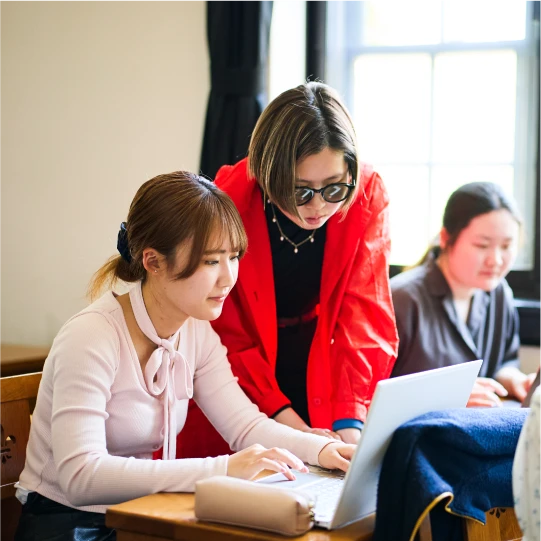
- ABOUT GLAP
- PROGRAM
- LIFE @GLAP
-
DISCOVER
LIBERAL ARTS -
ADMISSION
&
AID

WHAT IS LIBERAL ARTS?
Liberal arts education is an essential learning experience for today's university students to cultivate the strengths to build the future. Exploring a wide range of topics beyond specialized knowledge expands individual future possibilities.
“What is liberal arts?”

More than a general education, liberal arts originated from ancient Greece and Rome with the ambition to provide all the necessary knowledge to live as a free man. They developed in medieval Europe through the seven subjects of Grammar, Rhetoric, Logic, Arithmetic, Geometry, Astronomy and Music.
“What about modern liberal arts?”

Today they no longer refer to specific fields of study but to a broad range of knowledge and perspectives. Unlike specialized university education, liberal arts rely on interdisciplinary learnings that foster problem-solving skills, creative thinking and other essential abilities needed to thrive in today's globalized world.
Embrace
diverse
perspectives
Forster
the ability
to think
independently
Learn to
approach
challenges with
resilience
Enhance
creativity
WHY LEARN?

Today's world is facing complex issues and changing rapidly. Specialized knowledge alone is no longer enough to approach globalization, environment issues, technological innovations or multiculturalism. A new global context is making liberal arts increasingly vital for coming students. How can liberal arts education be impactful today?
Education has traditionally focused on seeking one "right" answer. However, many contemporary issues require complex answers grounded into multiple perspectives
Examples:
Environmental issues
How to balance economic growth and environmental sustainability?AI and the labor market
As AI threatens to take over work, how will humans add value?Multiculturalism
How can people of different religions and values coexist?Such challenges call for open perspectives, the ability to understand others, as well as the skills to bring different views together. Liberal arts education trains students to think through complex issues.
As AI and automation evolve, the nature of work is undergoing a profound transformation. Specialized knowledge alone may not remain useful in the future. What is needed in this era are the uniquely human abilities that AI cannot replicate: the capacity for flexible thinking and innovation.
Creativity
The ability to generate new ideasCritical thinking
The skills to analyze information and make sound judgmentsCommunication skills
The skill to engage in dialogue and build mutual understanding across differencesIn the past, it was common to work for one company until retirement. Today, however, the system of lifetime employment has collapsed, and changing jobs or careers is becoming a new norm. In the future, the ability to learn new skills and adapt to new fields as circumstances demand, rather than relying on a single area of expertise, will be essential. A liberal arts education will provide you with the following skills.
Continuous learning ability
Flexibility in acquiring new knowledgeBroader perspectives
Holistic application of multiple fields of studyAdaptability
Resilience in changing environmentsQualities and skills that companies seek are evolving. In the past, specialists with specific skills were highly valued, but today, there is a great and growing demand for those who can solve problems and connect different fields. For example, it is well known that one of Google’s hiring criteria is “Intellectual Curiosity.” There is a growing belief in the business world that those who show interest beyond their own specialty and continue to learn are the ones who create real value. Liberal arts education aligns well with new corporate needs.
The idea of "liberal arts" comes from the notion of learning for the sake of living freely. Today, many people live for the sake of others’ approval, losing self-confidence and sight of their true direction. However, through a liberal arts education, individuals can cultivate the following strengths.